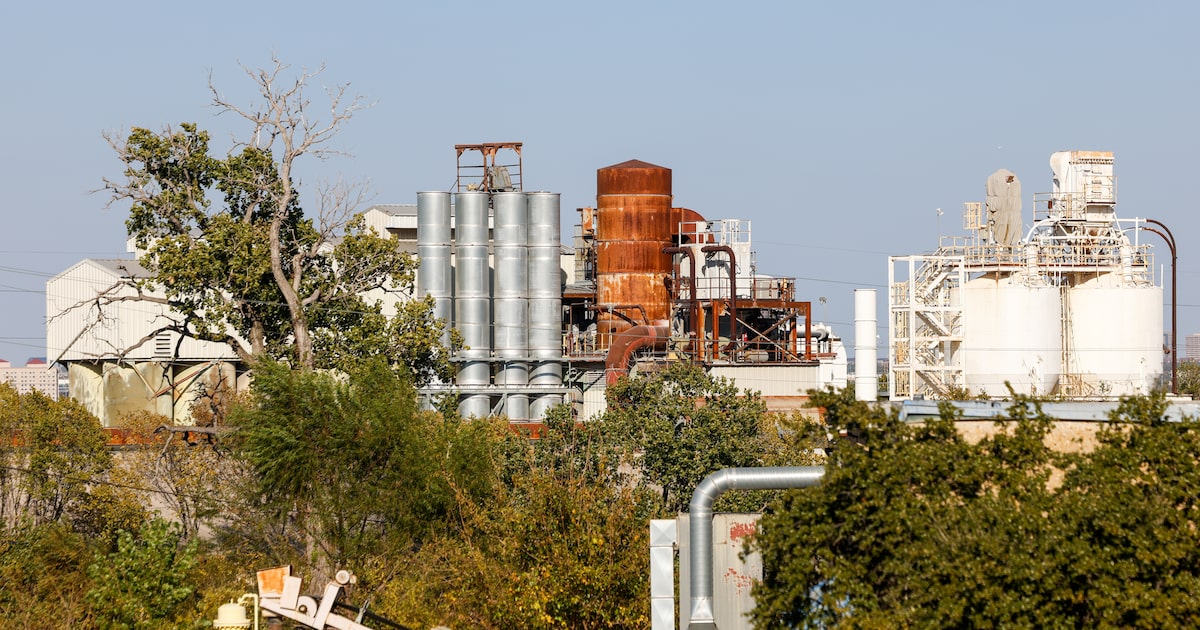For three years, residents along Singleton Boulevard in West Dallas have pushed the city for changes that would limit industrial facilities, and this week, they’ll get to have their say.
A community meeting is scheduled for Tuesday at the West Dallas Multipurpose Center at 6 p.m. to gather feedback from residents on rezoning the area.
Related

Residents want to reduce heavy industrial uses, prevent displacement and protect the character of their neighborhoods, many of which are home to Latino and Black communities.
In late 2022, after the community pushed for it, District 6 City Plan Commissioner Deborah Carpenter asked the commission to include an authorized hearing on its agenda to address land uses that are incompatible with residents’ needs.
Political Points
Since then, the hearing has been pending.
Now the process is moving forward, and the city-initiated zoning case must undergo a round of community meetings to gather recommendations. Then, the City Plan Commission and City Council must approve it.
Residents raised concerns for years about living near industrial facilities. Janie Cisneros, leader of Singleton United/Unidos, has led a campaign for more than five years to shut down GAF, a roofing materials company headquartered in New Jersey, which has operated its West Dallas facility at 2600 Singleton Blvd. for almost 80 years.
Related
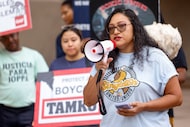
The GAF property is currently zoned for industrial research. GAF has said in the past it will close in July 2029, but its neighbors want them out sooner.
Rezoning the Singleton corridor aligns with ForwardDallas, the city’s updated land-use plan adopted in 2024. In that plan, the corridor is no longer designated as an industrial zone. Instead, it is envisioned for residential uses, “commercial flex” areas and neighborhood-serving business space.
“This area has always been industrial,” Cisneros said. “But the land-use changes that were adopted are already a huge win. The vision is no longer industrial.”
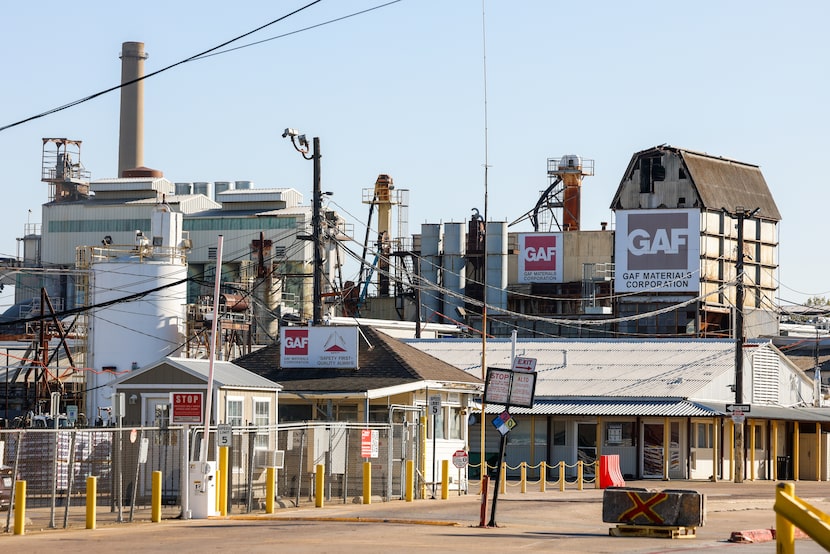
A GAF Roofing factory operates at Singleton Boulevard on Friday, Nov. 14, 2025, in Dallas.
Christine Vo / Staff Photographer
In an email statement, GAF said, “They have been a proud local employer with more than 160 employees, a track record of safety and environmental compliance, and continued involvement in the local community.”
“Since announcing plans to close the West Dallas facility in July 2029, we have been supportive of repurposing the land in the future in a way that supports the city’s vision for West Dallas and will continue to work with West Dallas officials on those efforts,” reads the statement.
The area set to be rezoned is approximately 256 acres bound by Singleton Boulevard to the north, Borger Street/Burton Drive to the east, Union Pacific Railway to the south and Westmoreland Road to the west. It currently supports a diverse mix of small and large businesses, including industrial, residential and commercial uses.
Businesses range from auto-repair shops, restaurants, towing services and roofing companies to landscaping operations. The Thomas A. Edison Middle Learning Center, St. Mary of Carmel Church and School and the West Dallas Multipurpose Center are also located in this area.
Authorized hearings
For many residents like Cisneros, the hearing is seen as a step toward stabilizing a neighborhood where housing sits next to long-established factories.
Authorized hearings are city-initiated rezoning processes. The city will review existing zoning across the area and determine whether it should change to reflect the city’s long-term planning goals.
In an email, the Planning and Development Department said the process typically takes between six months and two years from the first community meeting to City Council consideration. A minimum of three meetings is required for these hearings. Still, due to the diversity and complexity of land use issues in West Dallas, the department anticipates the need for additional meetings.
Cisneros said the community first requested rezoning in 2022 to help homeowners rebuild aging or damaged houses and prevent further displacement. Residents gathered property owner signatures and delivered them directly to City Hall.
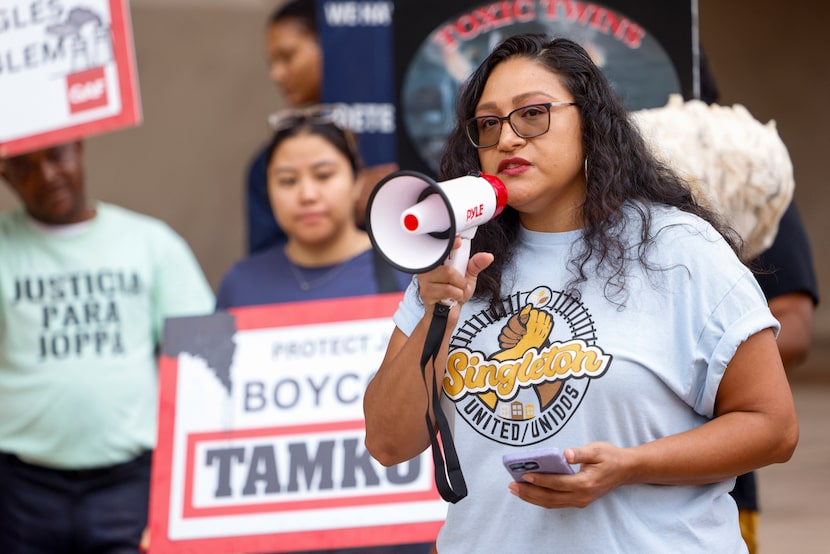
Janie Cisneros, leader of Singleton United, speaks during a news conference to announce Toxic Twins: Fund the Fund Campaign outside Dallas City Hall, Monday, July 14, 2025, in Dallas. The campaign pushes for the removal of TAMKO and GAF through the city’s nonconforming use fund.
Elías Valverde II / Staff Photographer
“We asked the city to rezone all of our single-family homes to residential,” she said. “We can’t get home loans, and we can’t rebuild if a house gets demolished. Families have been pushed out because of that.”
Instead of granting the request immediately, city staff proceeded with the broader authorized hearing. Cisneros believes the decision may have been meant to show progress while slowing the process.
“It took all of that effort just to get the authorized hearing on the agenda,” Cisneros said.
District 6 council member Laura Cadena, whose district includes the Singleton Boulevard corridor, did not respond to multiple emails, texts and phone calls requesting comment.
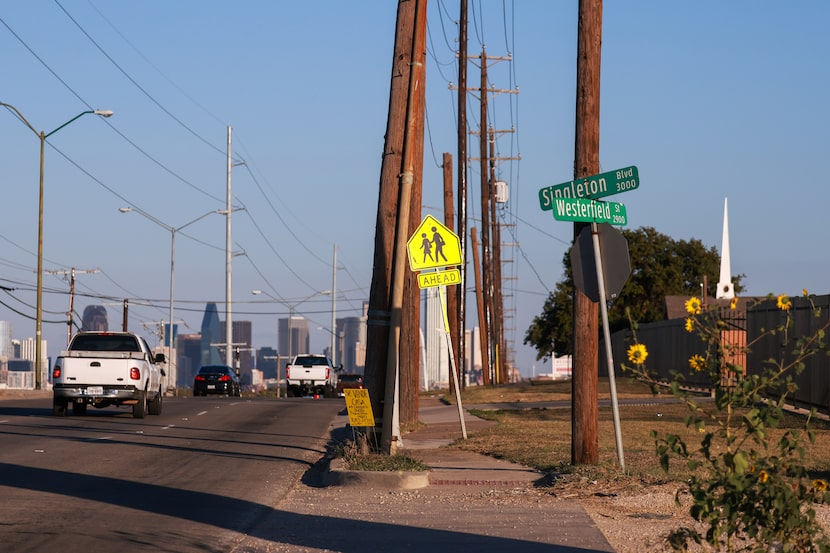
Cars drives down Singleton Boulevard as downtown Dallas is seen on Friday, Nov. 14, 2025, in Dallas.
Christine Vo / Staff Photographer
Lengthy rezoning
The delayed start of the Singleton corridor hearing fits a pattern seen in other Dallas neighborhoods where residents have sought to change longstanding industrial zoning.
In the Floral Farms neighborhood in Southeast Dallas, residents spent six years seeking zoning changes for the property that once held the illegal Shingle Mountain, a 70,000-ton mountain of roofing debris.
The City Council eventually approved the rezoning in February, following repeated rounds of planning and neighborhood meetings. Residents said the vote was welcome, but long overdue.
Related
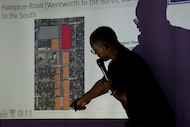
In west Oak Cliff, another authorized hearing moved forward, despite significant opposition from residents who feared displacement and the pressures of redevelopment. The City Council approved the rezoning of the Hampton-Clarendon corridor from commercial to a walkable, mixed-use development in August 2025, following months of debate.
Both cases took years and required multiple hearings, draft plans, revisions and negotiation. The outcomes also differed: the Floral Farms case reflected residents’ requests, while the west Oak Cliff changes proceeded over objections.
State law adds another layer
In recent years, changes in state law have made it more challenging for cities to require polluting businesses to shut down. Dallas officials previously used a process called amortization to phase out incompatible industrial uses, but state lawmakers restricted that tool in 2024.
Rezoning rules can be changed for future development, but existing businesses can continue operating as long as they meet city and state regulations.
City staff have noted that the authorized hearing does not determine whether a facility must close. Instead, it determines what could replace it if it were to leave.
Related
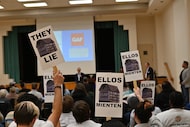
Following Tuesday’s meeting, a follow-up community meeting will be held, during which city staff will discuss feedback and zoning recommendations for the area.
“We’re looking forward to the process,” Cisneros said. “We already have a community-led vision approved in ForwardDallas. At this point, we’re just asking the city to align the zoning with what’s already there.”
